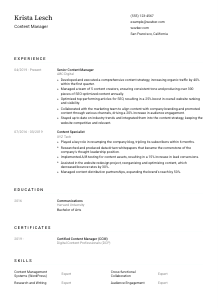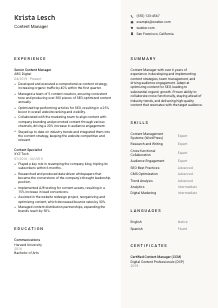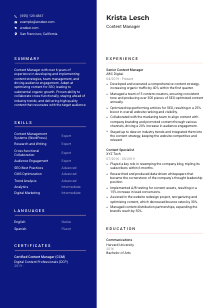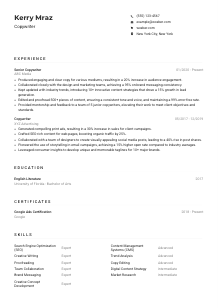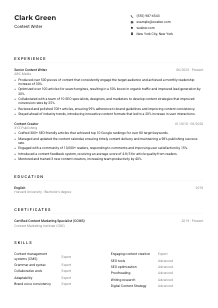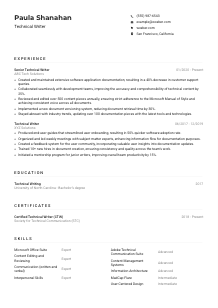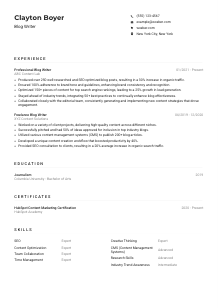Content Manager Resume Example
Crafting narratives, but your resume doesn't tell your story? Delve into this Content Manager resume example, shaped with Wozber free resume builder. Discover how you can blend your content mastery with job guidelines, ensuring your professional journey reads as engagingly as the stories you curate!
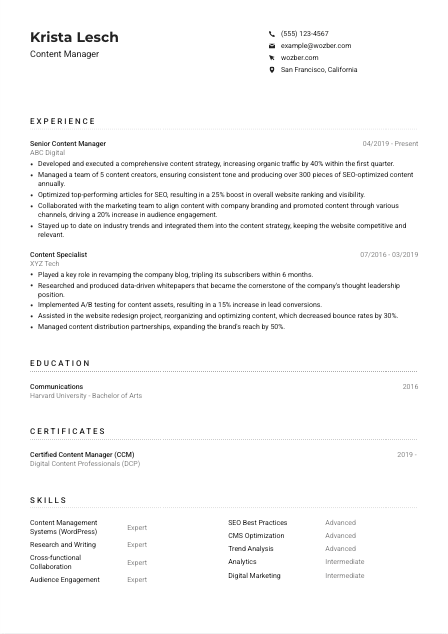
How to write a Content Manager resume?
Hello, aspiring Content Manager! In an era where content is king, your resume isn't just a piece of paper—it's your ticket to narrating your professional saga. With the digital landscape constantly evolving, showcasing your prowess through a meticulously crafted resume is non-negotiable. Partner with the Wozber free resume builder on this journey to mold your resume into a beacon that guides you to your dream Content Manager role.
Ready to make your mark? Let's turn the page to a new chapter in your career!
Personal Details
In the realm of resumes, first impressions are paramount. Your Personal Details section is the entry gate into your world. Here, precision meets personal branding, ensuring every element serves a purpose. For that Content Manager role you're eyeing, let's sculpt this section to perfection.
1. Embolden Your Name
Make your name resonate. Employ a font that stands out yet remains professional. Think of it as the headline to your personal story. This isn't just typography; it's your initial handshake with the hiring manager.
2. Declare Your Ambitions
Right beneath your name, proudly state your career aspiration—Content Manager. This anchors your resume, aligning it instantly with the job at hand. It's a subtle nudge to the hiring manager, reaffirming that what they seek is exactly what you offer.
3. Make Contacting You a Breeze
Your phone number and email address are your lifelines—ensure they're correct and professional. A tip: steer clear of quirky email addresses. Stick to a format that champions professionalism: firstname.lastname@example.com. This attention to detail speaks volumes.
4. Pin Your Location to the Map
"Must be located in San Francisco, California." The job specifics call for it, so highlight your San Francisco residence upfront. This isn't just about geography; it shows you're ready to dive in without the hurdles of relocation.
5. A Dash of Digital Presence
In our connected world, a LinkedIn profile is your digital handshake. Make sure it's polished and mirrors the narrative your resume tells. This digital footprint can be your silent advocate long before the first interview.
Takeaway
This section isn't just administrative—it's your first step into the spotlight. By knitting together these details with care, you're not just sharing your contact info; you're setting the stage for your professional narrative to unfold. Let each detail be a thread that weaves into the rich tapestry of your career aspirations.





Experience
The Experience section is where your narrative takes root. Here, your career story unfolds, detailing your journey through the lands of content creation and management. It's more than a list; it's a testament to your growth and impact in the content domain. Let's delve into shaping this section with precision, making every word count for that Content Manager position.
- Developed and executed a comprehensive content strategy, increasing organic traffic by 40% within the first quarter.
- Managed a team of 5 content creators, ensuring consistent tone and producing over 300 pieces of SEO‑optimized content annually.
- Optimized top‑performing articles for SEO, resulting in a 25% boost in overall website ranking and visibility.
- Collaborated with the marketing team to align content with company branding and promoted content through various channels, driving a 20% increase in audience engagement.
- Stayed up to date on industry trends and integrated them into the content strategy, keeping the website competitive and relevant.
- Played a key role in revamping the company blog, tripling its subscribers within 6 months.
- Researched and produced data‑driven whitepapers that became the cornerstone of the company's thought leadership position.
- Implemented A/B testing for content assets, resulting in a 15% increase in lead conversions.
- Assisted in the website redesign project, reorganizing and optimizing content, which decreased bounce rates by 30%.
- Managed content distribution partnerships, expanding the brand's reach by 50%.
1. Dissect the Role
Let's start with forensic precision: break down the job description. Highlight phrases like "develop and execute a content strategy," or "optimize content for SEO." These aren't just tasks; they're milestones in your career journey waiting to be matched with your accomplishments.
2. The Structure of Your Story
Chronology is key. Start with your most recent role, painting a picture of your growth. Each position you've held is a chapter, detailing your evolving expertise. Remember, consistency in how you present job titles and dates helps the reader navigate your professional saga with ease.
3. Narrate Your Impact
Each role you've embraced is ripe with accomplishments. Tailor these achievements to echo the job description. Did you develop a content strategy that increased organic traffic? That's your headline. Quantify your impact wherever possible; numbers bring your narrative to life.
4. The Power of Numbers
Speaking of numbers, they're the secret sauce. Increasing traffic by 40% or boosting website ranking by 25%—these aren't just stats; they're testimonials to your skill. Showcasing these achievements makes your resume not just a document, but a compelling argument for your candidacy.
5. Relevance is Your North Star
Stay the course. While it's tempting to include all your victories, focus on those that align with the Content Manager's role. This section is about your relevance to the position at hand. Let each bullet point be a beacon leading the hiring manager to one conclusion: you're the one.
Takeaway
By meticulously matching your experience with the job's requirements, you're not just filling in sections; you're constructing a bridge from your past achievements to your future aspirations. The Experience section is your battleground, where you showcase your victories, innovation, and impact. Tailor it well, and let it speak volumes of your journey.
Education
The Education section might seem like a straightforward recount of your academic past, but within it lies the potential to bolster your candidacy for the Content Manager role. It's about highlighting not just where you've studied, but how your academic journey has prepared you for the challenges ahead. Let's navigate through sculpting this section to reflect your readiness for the role.
1. Align Your Degree
"Bachelor's degree in Marketing, Communications, Journalism or related field." Your degree isn't just a title; it's proof of your foundational knowledge. Ensure it aligns with the job requirements. This alignment speaks directly to your preparation for the intricacies of content management.
2. Clarity is Key
Present your educational background with clarity. The institution's name, your degree, and the field of study should be laid out simply. This clear structure guides the hiring manager through your academic qualifications with ease.
3. Echo the Job Description
"Bachelor of Arts in Communications." This isn't just meeting a requirement; it's showcasing your domain-specific preparation. If your degree perfectly aligns with what the job seeks, you're underscoring your ready-to-hit-the-ground-running capability.
4. Courses that Count
When applicable, spotlight key courses relevant to content management or digital marketing – especially if they directly influence your approach to content strategy or SEO optimization. These add layers to your academic portrait, showing depth in your field.
5. Celebrate Academic Achievements
Honors, relevant extracurriculars, or significant projects—these are the accents that add depth to your academic story. Choose to highlight those that reinforce your fit for the Content Manager role. Think of this as adding texture to your academic narrative.
Takeaway
The Education section is your academic montage, showing the roots of your expertise. By aligning it with the role's requirements, you're not just ticking a box; you're illustrating how your academic journey has equipped you for the milestones ahead. Let it be a testament to your preparedness and passion for the field of content management.
Certificates
In the ever-evolving realm of content management, continuous learning isn't just encouraged; it's expected. The Certificates section of your resume offers a glimpse into your dedication to staying ahead of the curve. Let's dive into how you can strategically showcase certifications to bolster your candidacy for the Content Manager role.
1. Spotlight the Relevant
While the job description might not specify certifications, highlighting ones like Certified Content Manager (CCM) showcases your commitment to the profession. Choose certifications that resonate with the tasks and responsibilities of a Content Manager, adding a layer of expertise to your profile.
2. Quality Over Quantity
It's tempting to list every certification you've ever earned, but relevance wins the race. Prioritize those that align closely with content management, digital marketing, or SEO. This focus ensures that the hiring manager immediately sees the value you bring to the table.
3. Timelines Tell Tales
For certifications, dates matter. They indicate your current expertise and dedication to continuous learning. Whether it's a recent achievement or an accolade you've maintained, the dates give your certifications context within your career timeline.
4. Keep the Wheel Turning
The digital landscape is in a constant state of flux, with new tools and techniques emerging. Emphasize your commitment to staying abreast of industry trends through ongoing certifications. This proactive approach to learning underscores your readiness for the challenges of content management.
Takeaway
The right certifications can be a powerful addition to your resume, serving as proof of your skills and your commitment to professional growth. In the competitive field of content management, they can be the edge that sets you apart. Let them illuminate your path to the Content Manager role, showcasing your dedication to mastering the craft.
Skills
The Skills section of your resume is your professional arsenal. Here, you display the tools and techniques that make you an adept Content Manager. In a field where precision meets creativity, showcasing your skills is critical. Let's explore how to strategically curate this section to resonate with the demands of your dream role.
1. Mirror the Job's Language
Begin by matching the job description's language. Phrases like "proficiency in content management systems" or "familiarity with SEO best practices" aren't just requirements; they're keywords. This mirroring not only passes the ATS scan but also positions you as a direct match for the role.
2. Balance Hard and Soft Skills
While hard skills like CMS proficiency or SEO optimization are non-negotiable, don't underestimate the power of soft skills. Highlighting your ability for cross-functional collaboration or your keen eye for detail complements your technical prowess, painting a holistic picture of your capabilities.
3. Prioritize and Organize
Instead of cataloging every skill you possess, prioritize those most relevant to a Content Manager. This isn't just a list; it's a strategic showcase of your professional toolkit. Make it easy for the hiring manager to see why you're the best fit for the role.
Takeaway
Your Skills section is a testament to your preparedness for the role. By thoughtfully selecting and organizing your skills, you're not just listing competencies; you're underscoring your suitability for the Content Manager position. Let each skill you list serve as a beacon, guiding the hiring manager towards your candidacy.
Languages
In a globalized world, linguistic skills can be a significant asset, especially in content management where understanding diverse cultures and audiences is key. Your resume's Languages section is more than a nod to multilingualism—it's an opportunity to showcase your readiness for a global stage. Let's unfold how to make your linguistic abilities stand out.
1. Highlight the Non-negotiable
"English fluency is a critical requirement." When the job spells out a language requirement so clearly, ensure it's front and center in this section. Your fluency is not just a skill; it's your ticket to effective communication in the role.
2. Showcase Additional Languages
Beyond the must-haves, listing additional languages you're fluent in can set you apart. Each language is a doorway to a new audience, a new market. For a Content Manager, this capability speaks volumes about your potential for global engagement.
3. Honesty in Proficiency
Be precise about your language proficiencies. Whether you're native, fluent, intermediate, or basic, clarity here ensures there are no misunderstandings. This honesty speaks to your integrity and sets clear expectations about your communication capabilities.
4. The Bigger Picture
For roles with an international dimension or that cater to diverse audiences, your language skills can be a distinctive advantage. They not only demonstrate your versatility but also your readiness to navigate the complexities of a global content landscape.
5. A Global Mindset
Whether your proficiency is intermediate or native, each language you speak adds a layer to your global perspective. This isn't just about fluency; it's about embracing and understanding diverse cultures—a critical skill for any Content Manager looking to make an impact on the world stage.
Takeaway
Understanding and speaking multiple languages isn't just a line on your resume; it's a testament to your ability to connect across borders. In the realm of content management, this skill is invaluable, allowing you to craft narratives that resonate worldwide. View your linguistic skills as a bridge, connecting you to a broader audience and a richer professional experience.
Summary
The Summary is your resume's opening act, an elevator pitch that must captivate from the first word. In the competitive field of content management, where your ability to engage is paramount, your Summary isn't just an introduction—it's your headline, your hook, your chance to make an indelible first impression. Let's explore how to tailor this section for maximal impact.
1. The Essence of Your Journey
Begin by reflecting on the core of the Content Manager role and your unique journey within this realm. This isn't just about years of experience; it's about the depth and breadth of your expertise. Start your Summary with a statement that encapsulates your professional identity and aspirations.
2. Echo the Key Notes
Pepper your Summary with keywords and phrases from the job description. This resonance isn't mere repetition; it's about aligning your narrative with the role's requirements, showing the hiring manager you're not just a candidate but the candidate.
3. Highlight Your Headliners
Select a few pivotal achievements or skills and spotlight them here. Think of these as your headlining acts, the highlights that define your career. This selective emphasis helps shape the hiring manager's perception, guiding them towards your most impactful contributions.
4. Conciseness is Key
While it's tempting to detail every achievement, the power of a Summary lies in its brevity. Aim for 3-5 impactful lines—a teaser that entices the hiring manager to read on. This is your narrative distilled to its essence, a glimpse into the story that unfolds across your resume.
Takeaway
The Summary isn't just the start of your resume; it's the start of a conversation. Craft it with care, infusing it with your unique blend of skills, achievements, and aspirations. Let it be a powerful prelude to your professional saga, compelling the hiring manager to delve deeper into the narrative you've woven. You have the makings of a standout Content Manager; let your Summary be the spotlight that shines on them.
Embarking on Your Content Manager Voyage
As we close this guide, take a moment to reflect on the journey ahead. With your resume as your map and the insights shared as your compass, you're ready to navigate the competitive landscape of the content management profession. Lean on the Wozber free resume builder, with its ATS-compliant resume format and ATS-friendly resume templates, to ensure your professional story is not just told but heard.
Your aptitude, coupled with the precision of a well-crafted resume, is a combination poised for success. Stand tall, content virtuoso—your next chapter awaits!

- Bachelor's degree in Marketing, Communications, Journalism or related field.
- A minimum of 3 years' experience in content management, content marketing, or related roles.
- Proficiency in content management systems, specifically with WordPress.
- Strong research, writing, and editing skills with a keen eye for detail.
- Familiarity with SEO best practices and the ability to optimize content for search engines.
- English fluency is a critical requirement.
- Must be located in San Francisco, California.
- Develop and execute a content strategy that aligns with the company's brand and business objectives.
- Manage content creation, ensuring high-quality and consistent tone across all platforms.
- Optimize content for SEO and analytics, conduct regular content audits, and gather user feedback to improve customer experience.
- Collaborate with cross-functional teams, including Marketing, Design, and Product, to deliver content within deadlines.
- Stay updated on industry trends and best practices to ensure our content remains competitive and relevant.





